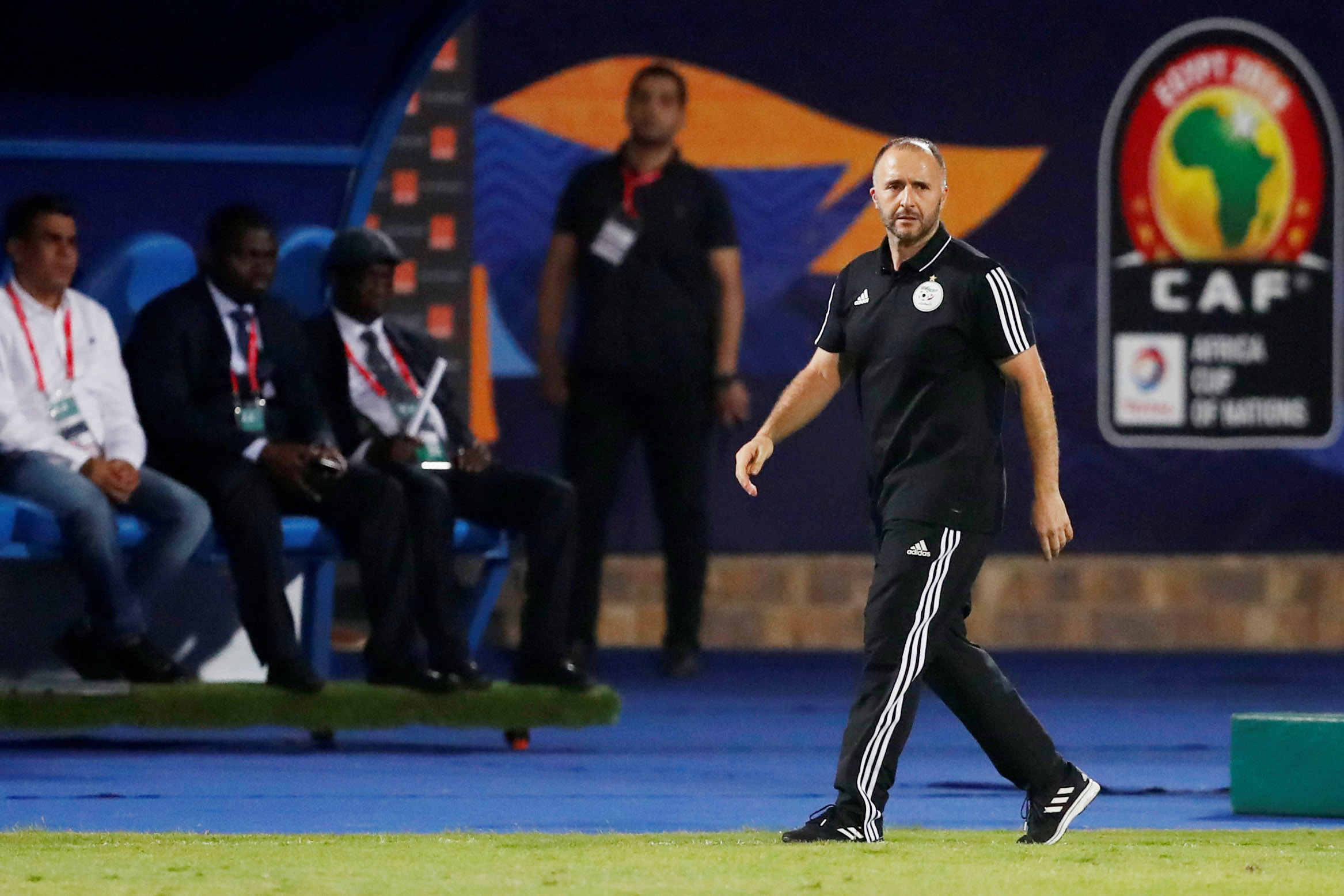The cure for Algeria’s football ills
Djamel Belmadi wants to celebrate his one-year anniversary next month as Algeria’s national coach with a gold medal from the Africa Cup of Nations.
Author:
6 July 2019

Algerian Football Federation president Kheireddine Zetchi said football in the country was “sick” prior to the appointment of Djamel Belmadi as coach of The Greens on 2 August last year. In less than a year, not only has the 43-year-old cured Algerian football of its ills, he also has the country believing that the almost three decade-long Africa Cup of Nations (Afcon) trophy drought could come to an end in Egypt.
Algeria’s journey to this strong position hasn’t been all smooth sailing. In the space of two years, the national team suffered a first-round exit at the 2017 Afcon, failed to qualify for the 2018 World Cup and had gone through six coaches. Zetchi’s first two coaching appointments, Lucas Alcaraz and Rabah Madjer, were thorough disappointments, and though he was being lauded for his long-term developmental vision, opposition began to form regarding Zetchi’s ability to appoint the right manager.
As a result, he was determined to bring in a manager with a “big name” that would appease the Algerian public. Two candidates were quickly earmarked for succession: Carlos Queiroz and Vahid Halilhodžić. Both men had extensive experience coaching on the continent and would have been popular appointments. But neither the Portuguese nor the Bosnian manager showed the interest or willingness to compromise financially.
So Zetchi brought in Belmadi, a young Algerian manager whose name had been doing the rounds of the rumour mill for several years.
Belmadi to the rescue
Belmadi described the Algeria job as “the Holy Grail” and admits that the vacancy was on his radar for a long time.
“It was impossible to not think about this post. I coached Qatar, I played with the Algerian national team and was captain. But it was presumptuous to assume I would one day have the job because it was the Holy Grail for me. I’m still young, so I was telling myself I had to prove myself, but it came naturally.”
It became evident during Belmadi’s home debut against Benin that a miserable chapter of Algerian football history had been definitively shut, with exciting times ahead. A respectable turnout at Mustapha Tchaker Stadium immediately voiced their support, a stark contrast in attitude compared with his predecessor, Madjer.
Related article:
“The people are with you, Belmadi” and “Allahu Akbar, Djamel Belmadi” were the chants that filled the Blida air that evening.
Though he is incontestably one of Algeria’s best ever players, Madjer was an anachronistic appointment. He had spent a decade on Algerian television criticising Algerian internationals, pontificating about the improvements he would usher in. His comments did not sit well with several players, particularly veteran Sofiane Feghouli, who hit back on Instagram after a drab 1-1 draw with Cameroon in 2016.
“Some people … propagate rumours because they have a problem with dual nationals or ‘émigrés’,” wrote the Galatasaray midfielder.
Less than a year later, in the midst of managerial instability, Feghouli backed Belmadi for the vacant Algeria job on a podcast. “Honestly, I only have one name in mind for our next coach: Djamel Belmadi. He is competent and loves the Algerian national team.”
An inspirational figure
For players of this generation, Belmadi was one of the first real stars they had grown up watching in the Algerian national team. Though he cut his teeth at Paris Saint-Germain, Belmadi was a relatively late bloomer. It wasn’t until the age of 24 that he played regular top-flight football in France for Olympique de Marseille.
During the 2000-2001 season, Belmadi led Les Phocéens in goals and assists. He also captained a very poor Algeria during the infamous friendly against the then European and World Champion French national team. Algeria were pummelled 4-1 in 2001, but not before Belmadi curled in a beautiful free kick past Fabien Barthez.
As a player, Belmadi was quintessentially Algerian – a temperamental, supremely talented dribbler with an eye for goal. In the words of former French forward Christophe Dugarry, “he could dribble past you three times in a phone booth”. When his form dropped with Marseille and an obnoxious supporter insulted him at an away match against Strasbourg, Belmadi chucked his boots at him.
Like Rais M’Bolhi, Adlene Guedioura and Riyad Mahrez, Belmadi grew up in a Parisian banlieue, one of the vast postwar flatlands that encircle the city’s medieval limits. Like Baghdad Bounedjah or Youcef Belaïli, he hails from west Algeria and can communicate in the Algerian dialect. He is young enough to understand the modern player’s psyche and simultaneously old enough to impose himself as an authority figure.
“He has character. He’s like an Algerian Vahid [Halilhodžić] … rather than a French-Algerian one. He understands those born in Algeria and the émigrés,” says Hocine, an Algerian supporter who travelled to Egypt for the group stages.
When asked to explain how he inculcates respect and discipline in his squad, Belmadi displayed that he understands modern-man management in an era where footballers need a trusting atmosphere and a welcoming ear.
“My vision of coaching is about relationships. You have to know your players. How they feel and experience things. That is a major asset. If your players know that you are a straight shooter and being sincere, you will have their respect. You need to be clear and direct. These things seem obvious, but in our trade, they are not always so.”
A balanced system
Speaking at a pre-match press conference, Mahrez admitted that it had been four years since the Algerian national team had spent as much time training tactics as they do with Belmadi.
“Tactically, we work on a lot more. Since the [Christian] Gourcuff era, we had three or four coaches who did not work at all on our tactics. Coach [Belmadi] insists on tactics a lot and he uses the right words to motivate us.”
Belmadi’s stints abroad as a player – from France to Spain, England and Qatar – shaped him as a coach.
“There is not a manager I model myself around. It has more to do with my career and the coaches I have had,” he said. “I had coaches from East Europe, South America and Spain in the different European leagues I played in. I love football, so I observe everything that is done in the world of football. I take those ideas and make sure they conform to the way I see football. I am an eternal student. It is about gathering as much data as possible and then building your own identity.”
Related article:
After experimenting with several different line-ups and players, Belmadi has established this side’s identity. His 4-3-3 formation is perfectly complementary in the midfield, where the sometimes impulsive Adlene Guedioura has been assigned a defined “clean-up role” in front of defence. Alongside Guedioura, Ismaël Bennacer is playing a ball-carrying role to perfection.
The Empoli midfielder has been voted Man of the Match twice during the group stages. The Confederation of African Football named him the player of the group stage while Belmadi was named the best coach, to show how well Algeria have started the competition. The third midfielder in that trio, Feghouli, has played most of his career on the wing, but was immediately included in central midfield on Belmadi’s arrival.
Feghouli’s energy and combativeness are key to winning the midfield battle, but he is also a willing runner into space – a role neither Mahrez nor Belaïli undertake as wingers. With a balanced system and the right coach at the helm, Algeria head into their round of 16 match against Guinea on Sunday 7 July at 30 June Stadium in Cairo with their eyes on a Cup of Nations trophy they have never won outside of Algeria. Their only victory, in 1990, came at the expense of Nigeria in the final in Algiers.
“I am often lectured about a transition period. I put in 100% every day to win the competition. Why wait?”


